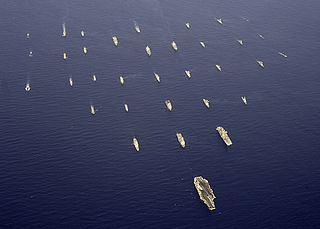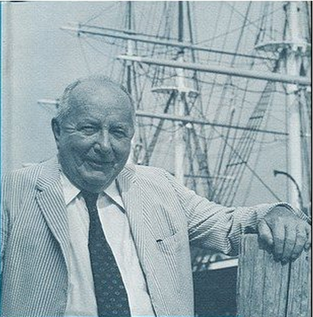Related Research Articles

Vice Admiral Christopher Angus Ritchie is a retired senior officer of the Royal Australian Navy, who served as Chief of Navy from 2002 to 2005.

Sir Julian Stafford Corbett was a prominent British naval historian and geostrategist of the late 19th and early 20th centuries, whose works helped shape the Royal Navy's reforms of that era. One of his most famous works is Some Principles of Maritime Strategy, which remains a classic among students of naval warfare. Corbett was a good friend and ally of naval reformer Admiral John "Jacky" Fisher, the First Sea Lord. He was chosen to write the official history of British Naval operations during World War I.

A blue-water navy is a maritime force capable of operating globally, essentially across the deep waters of open oceans. While definitions of what actually constitutes such a force vary, there is a requirement for the ability to exercise sea control at long range.

Canadian Forces Base (CFB) Halifax is Canada's east coast naval base and home port to the Royal Canadian Navy Atlantic fleet, known as Canadian Fleet Atlantic (CANFLTLANT), that forms part of the formation Maritime Forces Atlantic (MARLANT).

Robert Greenhalgh Albion was Harvard's first professor of Oceanic History and inspired two generations of maritime historians in the United States.

Andrew David Lambert is a British naval historian, who since 2001 has been the Laughton Professor of Naval History in the Department of War Studies, King's College London.

Geoffrey Till is a British naval historian and emeritus Professor of Maritime Studies in the Defence Studies Department of King's College London. He is the Director of the Corbett Centre for Maritime Policy Studies.
Roger Sarty is among Canada's leading historians, specializing in the history of Canada's Navy and coastal defence.
Gerald Sandford Graham was Rhodes Professor of Imperial History at King's College London from 1949 until his retirement in 1970. He earned a world reputation for his series of in-depth studies of the interrelationship between sea power and the development of the British empire.
Sir John Knox Laughton was a British naval historian and arguably the first to delineate the importance of the subject of Naval history as an independent field of study. Beginning his working life as a mathematically trained civilian instructor for the Royal Navy, he later became professor of modern history at King's College London and a co-founder of the Navy Records Society. A prolific writer of lives, he penned the biographies of more than 900 naval personalities for the Dictionary of National Biography.

The Navy Records Society was established in 1893 as a scholarly text publication society to publish historical documents relating to the history of the Royal Navy. Professor Sir John Knox Laughton and Admiral Sir Cyprian Bridge were the key leaders who organized the society, basing it on the model of earlier organisations such as the Hakluyt Society and the Camden Society. The American naval historian, Rear Admiral Alfred Thayer Mahan, was one of the first overseas members to join the Navy Records Society.
Rear Admiral James Vincent Purcell Goldrick, was an Australian naval historian, analyst of contemporary naval and maritime affairs, and a senior officer of the Royal Australian Navy (RAN). Following his retirement from the RAN, Goldrick was a fellow at the Sea Power Centre – Australia and an adjunct professor in the School of Humanities and Social Sciences in the University of New South Wales at the Australian Defence Force Academy. He was also a member of the Naval Studies Group at the Australian Centre for the Study of Armed Conflict and Society, an adjunct professor in the Strategic and Defence Studies Centre of the Australian National University and a professorial fellow of the Australian National Centre for Ocean Resources and Security at the University of Wollongong. He was a visiting fellow at All Souls College, University of Oxford in the first half of 2015, and a non-resident Fellow of the Lowy Institute from 2013 to 2018.
Rear Admiral John Richard Hill was a rear-admiral in the Royal Navy, a former chief executive of the Middle Temple, author, and editor of many books on naval affairs.
Peter Cozens is the Director of Finance for the New Zealand Oceans Foundation.

Vice Admiral Sir Peter William Gretton was an officer in the Royal Navy. He was active in the Battle of the Atlantic during the Second World War, and was a successful convoy escort commander. He eventually rose to become Fifth Sea Lord and retired as a vice admiral before entering university life as a bursar and academic.
The Corbett Centre for Maritime Policy Studies is a policy think-tank which conducts research and teaching on issues related to maritime security.
Vice Admiral Peter David Jones, is a retired senior officer in the Royal Australian Navy (RAN), who served as the Chief Capability Development Group (CCDG) from 2011 until his retirement in October 2014. He was succeeded as CCDG by Lieutenant General John Caligari.

Vice Admiral Mark Mellett, DSM, is a retired Irish Naval Service vice admiral and was Chief of Staff of Ireland's Defence Forces from September 2015 until September 2021.
Peter G Hore FRHistS naval officer, historian and obituarist, served a full career in the Royal Navy (1962-2000), spent ten years working in the cinema and television industry (2000-2009) and is a successful biographer and obituarist. One of his books, Habit of Victory, was the Daily Telegraph reader's choice and another book, Sydney, Cipher and Search was praised for its literary quality and depth of research and shortlisted for the Mountbatten Media Awards. His reasons for becoming an historian are published at British Naval History.
David Watkin Waters was a British naval officer, historian of navigation, and naval historian, who served as deputy director of the National Maritime Museum, Greenwich, 1971–1978.
References
- ↑ "Staff profile, University of Salford". Archived from the original on 30 May 2010. Retrieved 6 April 2010.
- 1 2 "Eric Grove". IISS. Retrieved 9 November 2018.
- ↑ "Candidates for Election to Council". Newsletter of the Society for Naval Research: 8. May 1992.
- 1 2 The Nelson Legacy Conference Series – 2007 speaker – Professor Eric Grove [ dead link ]
- ↑ "Some principles of maritime strategy". iDiscover. University of Cambridge. Retrieved 27 April 2021.
- ↑ "Eric Grove". IMDb. Retrieved 9 November 2018.
- ↑ "Sarian Grevelle Forum - Sarian Grevelle's death". www.forumjar.com. Retrieved 9 November 2018.
- ↑ "Remembering Eric Grove (1948-2021)". Politics and Contemporary History Research Group. Archived from the original on 16 April 2021. Retrieved 16 April 2021.
- ↑ Rosemary E Lunn Eric Grove: Influential, Inspirational Maritime Historian, dies X-Ray Magazine